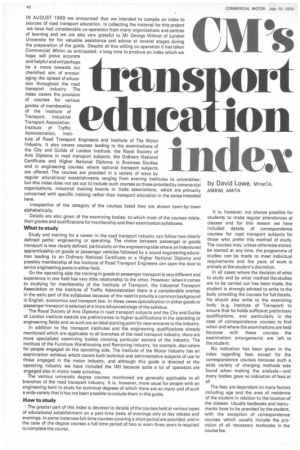grades of membership of the Institute of Transport, Industrial Transport Association, Institute of Traffic
Page 44

If you've noticed an error in this article please click here to report it so we can fix it.
Administration, Institute of Road Transport Engineers and Institute of The Motor Industry. It also covers courses leading to the examinations of the City and Guilds of London Institute, the Royal Society of Arts Diploma in road transport subjects, the Ordinary National Certificate and Higher National Diploma in Business Studies and in engineering courses where optional transport subjects are offered. The courses are provided in a variety of ways by regular educational establishments ranging from evening institutes to universities: but this index does not set out to include such courses as those provided by commercial organizations, industrial training boards or trade associations, which are primarily concerned with specific training rather than transport education in the sense intended here.
Irrespective of the category of the courses listed they are shown town-by-town alphabetically, Details are also given of the examining bodies, to which most of the courses relate, their grades and qualifications for membership and their examination syllabuses.
What to study
Study and training for a career in the road transport industry can follow two clearly defined paths: engineering or operating. The choice between passenger or goods transport is less clearly defined, particularly on the engineering side where an indentured apprenticeship on goods or passenger vehicles followed by a sound engineering education leading to an Ordinary National Certificate or a Higher National Diploma and possibly membership of the Institute of Road Transport Engineers can open the doorto senior engineering posts in either field.
On the operating side the training in goods or passenger transport is very different and experience in one field has very little relationship to the other. However, when it comes to studying for membership of the Institute of Transport, the Industrial Transport Association or the Institute of Traffic Administration there is a considerable overlap in the early part of the syllabuses because of the need to provide a common background in English, economics and transport law. In these cases specialization in either goods or passenger transport is selected at a more advanced stage of the syllabus.
The Royal Society of Arts Diploma in road transport subjects and the City and Guilds of London Institute awards are preliminaries to higher qualifications in the operating or engineering fields and as such a re an ideal starting point for new entrants to the industry.
In addition to the transport institutes and the engineering qualifications already mentioned which are applicable to all branches of the road transport industry, there are more specialized examining bodies covering particular sectors of the industry. The Institute of the Furniture Warehousing and Removing Industry, for example, also caters for people engaged on the operating side. The Institute of the Motor Industry has an examination syllabus which covers both technical and administrative subjects of use to those engaged in the motor industry, and although this guide is directed at the operating industry we have included the IMI because quite a lot of operators are engaged also in motor trade activities.
The various university degree courses mentioned are generally applicable to all branches of the road transport industry. It is, however, more usual for people with an engineering bent to study for technical degrees of which there are so many and of such a wide variety that it has not been possible to include them in this guide.
How to study
The greater part of this index is devoted to details of the courses held at various types of educational establishment on a part-time basis of evenings only or day release and evenings. In some instances full-time courses covering a short period are provided, and in the case of the degree courses a full-time period of two or even three years is required to complete the course. It is, however, not always possible for students to make regular attendances at classes and for this reason we have included details of correspondence courses for road transport subjects for those who prefer this method of study. The courses may, unless otherwise stated, be started at any time, the programme of studies can be made to meet individual requirements and the pace of work is entirely at the student's discretion.
In all cases where the decision of what to study and by what method the studies are to be carried out has been made, the student is strongly advised to write to the body providing the courses for full details. He should also write to the examining body (e.g. Institute of Transport) to ensure that he holds sufficient preliminary qualifications, and particularly in the case of correspondence courses to find when and where the examinations are held because with these courses the examination arrangements are left to the student.
No indication has been given in the index regarding fees except for the correspondence courses because such a wide variety of charging methods was found when making the analysis—and many bodies gave no indication of fees at all The fees are dependent on many factors including age and the area of residence of the student in relation to the location of the classes. Usually textbooks and instruments have to be provided by the student, with the exception of correspondence courses which usually include the provision of all necessary textbooks in the course fee.












































































































